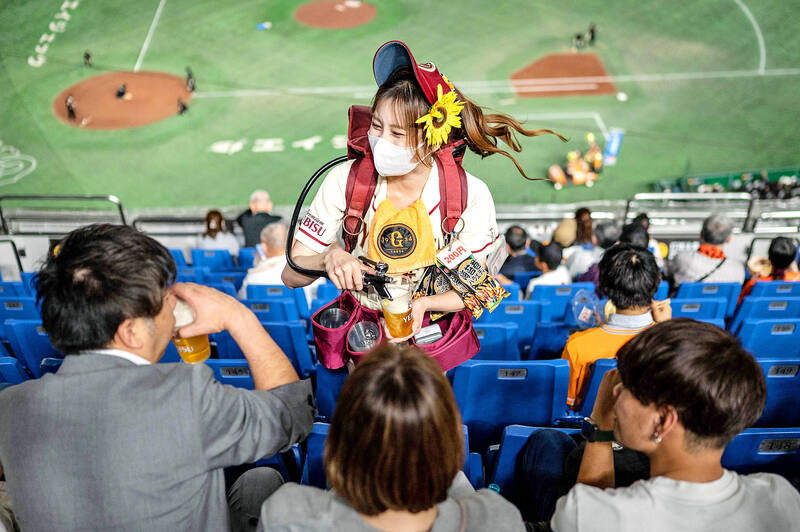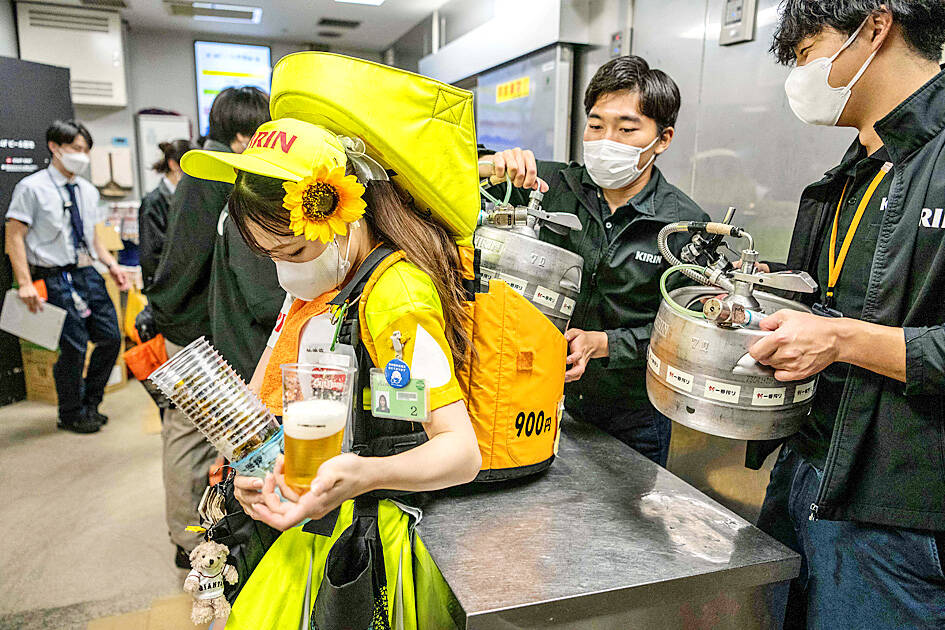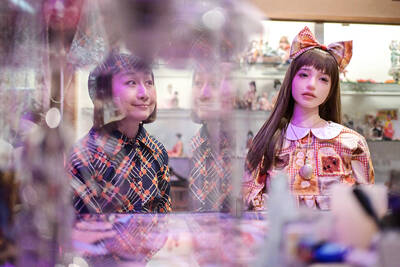In between chanting fans at Japan’s Tokyo Dome baseball stadium race an army of women in fluorescent uniforms carrying unwieldy backpacks with attached spray-guns.
These are the “uriko” — beer vendors who are as unique to Japanese baseball as the cheering sections that beat drums and blow horns to rally their teams.
Made up almost exclusively of young women in miniskirts or shorts, the tradition might appear outdated to some.

Photo: AFP
Warning: Excessive consumption of alcohol can damage your health
Japan has had its own low-key #MeToo movement, and women have in the past few years challenged everything from high heels at work to traditions requiring they serve tea to colleagues.
However, the uriko remain a firm favorite with fans of Japan’s most popular sport, which attracts a diverse crowd of men and women, as well as many families.
Honoka Hagiwara, who carries a keg weighing up to 15kg on her back for upward of three hours at a time, said she was attracted by the job’s “glamorous” image.

Photo: AFP
Warning: Excessive consumption of alcohol can damage your health
“I’ve been doing it for just over a year now, and I’ve got much more used to it,” the 22-year-old said.
She said that it was “physically very tough” at first, but she now enjoys the highly competitive job, with more than 100 rivals working any given game.
At Tokyo Dome, home to Japan’s most popular baseball team, the Yomiuri Giants, vendors sell an average of about 20,000 glasses of beer at a night game.
All the stadium’s vendors are women, although some men are employed at other stadiums in Japan.
It used to be the other way around: Until the 1980s, most vendors were men who sold beer from flat tables slung around their necks.
Tokyo Dome said the job is still open to anyone.
“There is not and will not be any obstacle standing in the way of men being employed,” a Tokyo Dome spokeswoman said.
Yet “around 100 times more” women apply than men, “so the result is that there are no men,” she said.
Uriko Mariko Matsumoto said she enjoys interacting with fans, and has built up a relationship with regulars.
The 25-year-old said she treats her customers the way she wants vendors to serve her at a game.
“I like going to watch baseball games myself, and when I see a vendor smiling, it makes me want to buy a drink,” Matsumoto said.
However, not all vendors have such a positive view of the job.
One former uriko said that the job was “creepy, creepy, creepy,” on a blogging site hosted by the Asahi Shimbun newspaper.
“It didn’t take me long to realize that I wasn’t only selling beer and snacks — I was selling myself,” said the author, who complained of customers asking to take her photograph and giving her unwanted business cards.
Security is on hand should drunk supporters get out of line, but trouble is rare at Japanese baseball games, which are a family day out for many.
Matsumoto said that her main concern is sales, and she is “always thinking” about her numbers.
“You’re paying attention to how much the others have sold and you’re ... trying to sell more than you did the day before,” she said.
Commission-based wages means it pays to work fast, although Hagiwara said that not keeping the customer waiting is the “top priority.”
While vendors are technically not allowed to run in the stands or on the stadium concourse, they are often seen racing from customer to customer.
They are easy to spot in brightly colored uniforms and artificial flowers in their hair beneath high-brimmed caps.
Some wear knee pads, as they have to bend down while serving to avoid obstructing the view.
They change kegs about 10 or 12 times a night with a speed that would put some Formula One pit stops to shame.
As support staff lift out the empty keg and replace it with a new one, vendors barely have time for a sip of cold tea — and sitting down for a breather is out of the question.
Hagiwara said more men should try the job, but not everyone at Tokyo Dome was so sure.
“A man? I’ve never thought about that,” said Sachiko Shibuya, 64, watching the game with her friend.
Yoshie Eki, 59, said she was not bothered who was dispensing the drinks.
“If I’m coming to the ballpark, I’m going to buy beer — it gets you more in the mood,” she said.

STILL HOPEFUL: Delayed payment of NT$5.35 billion from an Indian server client sent its earnings plunging last year, but the firm expects a gradual pickup ahead Asustek Computer Inc (華碩), the world’s No. 5 PC vendor, yesterday reported an 87 percent slump in net profit for last year, dragged by a massive overdue payment from an Indian cloud service provider. The Indian customer has delayed payment totaling NT$5.35 billion (US$162.7 million), Asustek chief financial officer Nick Wu (吳長榮) told an online earnings conference. Asustek shipped servers to India between April and June last year. The customer told Asustek that it is launching multiple fundraising projects and expected to repay the debt in the short term, Wu said. The Indian customer accounted for less than 10 percent to Asustek’s

‘DECENT RESULTS’: The company said it is confident thanks to an improving world economy and uptakes in new wireless and AI technologies, despite US uncertainty Pegatron Corp (和碩) yesterday said it plans to build a new server manufacturing factory in the US this year to address US President Donald Trump’s new tariff policy. That would be the second server production base for Pegatron in addition to the existing facilities in Taoyuan, the iPhone assembler said. Servers are one of the new businesses Pegatron has explored in recent years to develop a more balanced product lineup. “We aim to provide our services from a location in the vicinity of our customers,” Pegatron president and chief executive officer Gary Cheng (鄭光治) told an online earnings conference yesterday. “We

LEAK SOURCE? There would be concern over the possibility of tech leaks if TSMC were to form a joint venture to operate Intel’s factories, an analyst said Taiwan Semiconductor Manufacturing Co (TSMC, 台積電) yesterday stayed mum after a report said that the chipmaker has pitched chip designers Nvidia Corp, Advanced Micro Devices Inc and Broadcom Inc about taking a stake in a joint venture to operate Intel Corp’s factories. Industry sources told the Central News Agency (CNA) that the possibility of TSMC proposing to operate Intel’s wafer fabs is low, as the Taiwanese chipmaker has always focused on its core business. There is also concern over possible technology leaks if TSMC were to form a joint venture to operate Intel’s factories, Concord Securities Co (康和證券) analyst Kerry Huang (黃志祺)

It was late morning and steam was rising from water tanks atop the colorful, but opaque-windowed, “soapland” sex parlors in a historic Tokyo red-light district. Walking through the narrow streets, camera in hand, was Beniko — a former sex worker who is trying to capture the spirit of the area once known as Yoshiwara through photography. “People often talk about this neighborhood having a ‘bad history,’” said Beniko, who goes by her nickname. “But the truth is that through the years people have lived here, made a life here, sometimes struggled to survive. I want to share that reality.” In its mid-17th to